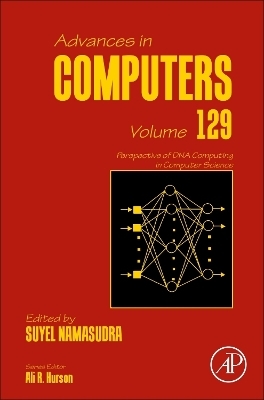
Perspective of DNA Computing in Computer Science
Academic Press Inc (Verlag)
978-0-323-85546-4 (ISBN)
There are many applications of DNA computing in the field of computer science. Nowadays, DNA computing is widely used in cryptography for achieving a strong security technique, so that unauthorized users are unable to retrieve the original data content. In DNA-based encryption, data are encrypted by using DNA bases (A, T, G, and C) instead of 0 and 1. As four DNA bases are used in the encryption process, DNA computing supports more randomness and makes it more complex for attackers or malicious users to hack the data. DNA computing is also used for data storage because a large number of data items can be stored inside the condensed volume. One gram of DNA holds approx DNA bases or approx 700 TB. However, it takes approx 233 hard disks to store the same data on 3 TB hard disks, and the weight of all these hard disks can be approx 151 kilos. In a cloud environment, the Data Owner (DO) stores their confidential encrypted data outside of their own domain, which attracts many attackers and hackers. DNA computing can be one of the best solutions to protect the data of a cloud server. Here, the DO can use DNA bases to encrypt the data by generating a long DNA sequence. Another application of DNA computing is in Wireless Sensor Network (WSN). Many researchers are trying to improve the security of WSN by using DNA computing. Here, DNA cryptography is used along with Secure Socket Layer (SSL) that supports a secure medium to exchange information. However, recent research shows some limitations of DNA computing. One of the critical issues is that DNA cryptography does not have a strong mathematical background like other cryptographic systems.
This edited book is being planned to bring forth all the information of DNA computing. Along with the research gaps in the currently available books/literature, this edited book presents many applications of DNA computing in the fields of computer science. Moreover, research challenges and future work directions in DNA computing are also provided in this edited book.
Suyel Namasudra has received Ph.D. degree from the National Institute of Technology Silchar, Assam, India. He was a post-doctorate fellow at the International University of La Rioja (UNIR), Spain. Currently, Dr. Namasudra is working as an assistant professor in the Department of Computer Science and Engineering at the National Institute of Technology Agartala, Tripura, India. Before joining the National Institute of Technology Agartala, Dr. Namasudra was an assistant professor in the Department of Computer Science and Engineering at the National Institute of Technology Patna, Bihar, India. His research interests include blockchain technology, cloud computing, DNA computing, and information security. Dr. Namasudra has edited 7 books, 5 patents, and 85 publications in conference proceedings, book chapters, and refereed journals like IEEE TII, IEEE TCE, IEEE T-ITS, IEEE TSC, IEEE TCSS, IEEE TCBB, ACM TOMM, ACM TOSN, ACM TALLIP, FGCS, CAEE, and many more. He is the Editor-in-Chief of the Cloud Computing and Data Science (ISSN: 2737-4092 (online)) journal. Dr. Namasudra has served as a Lead Guest Editor/Guest Editor in many reputed journals like IEEE TCE (IEEE, IF: 4.3), IEEE TBD (IEEE, IF: 7.2), ACM TOMM (ACM, IF: 3.144), MONET (Springer, IF: 3.426), CAEE (Elsevier, IF: 3.818), CAIS (Springer, IF: 4.927), CMC (Tech Science Press, IF: 3.772), Sensors (MDPI, IF: 3.576), and many more. He has also participated in many international conferences as an organizer and session chair. Dr. Namasudra is a senior member of IEEE, and a member of ACM and IEI. He has been featured in the list of the top 2% scientists in the world in 2021, 2022, and 2023. His h-index is 37.
1. Introduction to DNA Computing
Tarun Kumar and Suyel Namasudra
2. Security, Privacy and Trust Management of DNA Computing
Maria Fernandes, Jeremie Decouchant and Francisco Couto
3. DNA Computing in Cryptography
Jiechao Gao and Tiange Xie
4. A Novel Image Encryption and Decryption Scheme by using DNA Computing
Chiranjeev Bhaya, Arup Kumar Pal and SK Hafizul Islam
5. Hiding Information in an Image Using DNA Cryptography
P. Bharati Devi, P. Ravindra and R. Kiran Kumar
6. The Design of a S-box based on DNA Computing and Chaos Theories
Jun Peng, Shangzhu Jin, Yingxu Wang, Xi Zheng and Xiangren Wang
7. DNA Computing based Big Data Storage
Deepak Sharma and Manojkumar Ramteke
8. Securing Confidential Data in the Cloud Environment by using DNA Computing
Divyansh Agrawal and Sachin Minocha
9. Secure data communication using DNA computing adaptable to wireless sensor network
Satish Gunasekaran and Manish Kumar
10. Research Challenges and Future Work Directions in DNA Computing
Sachin Minocha and Suyel Namasudra
| Erscheinungsdatum | 02.03.2023 |
|---|---|
| Reihe/Serie | Advances in Computers |
| Verlagsort | Oxford |
| Sprache | englisch |
| Maße | 152 x 229 mm |
| Gewicht | 450 g |
| Themenwelt | Mathematik / Informatik ► Informatik ► Software Entwicklung |
| Informatik ► Theorie / Studium ► Künstliche Intelligenz / Robotik | |
| Mathematik / Informatik ► Mathematik | |
| ISBN-10 | 0-323-85546-6 / 0323855466 |
| ISBN-13 | 978-0-323-85546-4 / 9780323855464 |
| Zustand | Neuware |
| Informationen gemäß Produktsicherheitsverordnung (GPSR) | |
| Haben Sie eine Frage zum Produkt? |
aus dem Bereich


